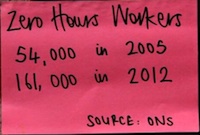After a series of revelations about zero-hours contracts, ERNIE JACQUES calls on the leaders of ‘One Nation Labour’ to show their support for Britain’s exploited working people.
Following a recent freedom of information request it has been revealed that 150 staff at the House of Commons are employed on zero-hours contracts. These lucky employees, on standby, or work without guaranteed hours or pay, include catering and clerical staff and visitor assistants.
The Unite trade union and some backbench Labour MPs have denounced these employment contracts as highly exploitative, turning workers into slave labour, and are calling for casual contracts to be banned. Andy Sawford, MP for Corby and East Northamptonshire, introduced a private members’ Bill to prohibit the use of zero-hours contracts, and a second reading and debate is scheduled for January 2014.
 While this Bill is unlikely to progress beyond a second reading, it is pleasing to know that some Labour MPs regard gross exploitation in the workplace as totally unacceptable. Unfortunately, the response from Ed Miliband and his shadow cabinet colleagues has been somewhat muted and, in terms of the spin associated with ‘One Nation Labour’, wholly inadequate and unconvincing.
While this Bill is unlikely to progress beyond a second reading, it is pleasing to know that some Labour MPs regard gross exploitation in the workplace as totally unacceptable. Unfortunately, the response from Ed Miliband and his shadow cabinet colleagues has been somewhat muted and, in terms of the spin associated with ‘One Nation Labour’, wholly inadequate and unconvincing.
Zero-hours contracts come without paid holidays, sick pay, employment rights or other fringe benefits, and are designed to create an ultra-flexible labour market. More than 300,000 care workers are now said to be on zero-hours contracts and they are spreading into all areas of the economy, used by employers such as the NHS, Morrisons, McDonalds, Boots and Amazon, while it’s said that nine out of 10 of Sports Direct’s 20,000 staff are on these contacts.
More and more employers and businesses are using zero-hours contracts to drive down unit labour costs and maximise their bottom lines, and some of the worst offenders are private recruitment agencies whose general approach to vulnerable jobseekers is disrespectful, indifferent and hard-hearted.
A survey by The Chartered Institute of Personnel and Development has rubbished government statistics, revealing that over one million workers are now employed on zero-hour contracts as work is casualised at an alarming pace. Companies that do pay the living wage face the threat of seeing their market share eroded by multi-national companies, such as Amazon, whose appetite for squeezing labour costs, avoiding tax and boosting profits seemingly has no bounds.
Privatised care
In the recent past I, like many others, have seen the consequences that these sorts of contracts have had on front line service providers and on vulnerable members of society. My mother was incapacitated shortly before her death last year and received ‘care in the community’, which proved to be a heartless, unpleasant and unproductive experience.
Former employees of York City Council saw their jobs outsourced and privatised during the Blair (New Labour) years. Their employment conditions were supposed to be protected under the much-vaunted TUPE rules, but they have been treated shamefully in this brave new world of privatised home care services. In the main these are compassionate and totally committed care workers, but they have seen their salaries and conditions of employment ruthlessly cut to the bone while suffering the imposition of impossible workloads.
In this new, lean and mean business world, many care workers no longer get paid when traveling between vulnerable ‘clients’, while those clients pay relatively high fees for a service which requires the carer to get elderly people out of bed, washed and dressed, with their breakfast made, the washing-up done, medication taken and a log book completed, all in 30 minutes. These employers must know that the people they employ are effectively being paid below the minimum wage.
Meanwhile, the NHS is under attack from the private sector as never before, and we have increasing numbers of doctors on £100,000-plus salaries, privatised American-owned surgeries, lobbying consultancies with links to big business, and the usual suspects proclaiming that charges should be made for doctors’ appointments and a range of other essential health services.
This week, Sir Bruce Keogh, the Medical Director of NHS England, stated that the NHS should be run like PC World and Dixons. Thanks to the BBC’s programme ‘Your Money, Their Tricks’ we now know that PC World pressurises sales staff to deliberately deceive customers out of every last penny they can get, whether or not the customers understand, need or want the particular goods on offer.
Is there any wonder our NHS and our care services are in crisis when the likes of Sir Bruce Keogh are put into positions of power and influence?
How did we get here?
After 18 years of the Thatcher and Major governments, and 13 years of Blair and Brown administrations, we now live in a scam, casino economy, a country where loyalty counts for virtually nothing and where practically everyday we get phone calls, texts and emails designed to trick us into buying something we didn’t ask for, or need, as a means of defrauding us of as much money as the perpetrators can get away with. How did we arrive at this state of affairs?
First, our trade unions were trashed and rubbished, our economy was deregulated, our public sector jobs and services outsourced, and it became easy to sack millions of hard-working UK citizens, and cut their wages and conditions. The unseen hand of the market was praised for its efficiency while absolutely nothing was done about the transfer of businesses overseas, or to counter growing workplace inequality. At the same time the unemployed and jobseekers were blamed and punished for the UK’s debt crisis as so-called flexible labour markets became our saviours.
 Meanwhile, the political class turn a blind eye to the effect all this has on workers, their families and children, many living in deprived neighbourhoods across the UK, communities which these MPs are paid to serve and represent.
Meanwhile, the political class turn a blind eye to the effect all this has on workers, their families and children, many living in deprived neighbourhoods across the UK, communities which these MPs are paid to serve and represent.
All this leads inexorably to zero-hour contracts, first for those at the bottom of the labour market, but later, be in no doubt, sure to spread to a workplace near you soon. This, after all, is the logic of unregulated markets – a race to the bottom via lower labour costs, together with ever increasing incomes and wealth for those at the top, those who manage and control our lightly-regulated, free-market economy.
Over the past 30 years good progress has been made on a range of social issues, such as race, gender and sexual orientation, social integration, civil rights, freedom of expression, cultural and religious tolerance, and acceptance of the value of a meritocratic society. But when it comes to the world of work many social liberals are surprisingly silent and, at best, ambivalent about the unfairness meted-out to millions of people who work day and night to enrich the lives of their fellow citizens.
Take business secretary Vince Cable, a Liberal Democrat MP who is often lauded by social liberals as a man of principle. He did the rounds of breakfast TV channels defending zero-hour contracts. It seems we are governed by people who see nothing wrong with workfare, with flexible labour markets, with job insecurity and with using state resources to subsidise multi-national companies – a government policy supported by Blairite politicians who proclaim their support for Ed Miliband’s One Nation Labour agenda.
What next?
Perhaps we should expect some form of modern day workhouse where society conveniently parks the long-term unemployed until they see the error of their ways. Such a suggestion may seem ridiculous to some, but that’s what many of us thought about workfare, casual work contracts, and welfare reform, not so long ago. I naively thought this level of workplace exploitation had been consigned to the dustbin of history by the rise of a popular labour movement. How wrong I was.
Millions of the UK’s most vulnerable working people will continue to be exploited, bullied and mistreated by their employers because of government inaction and because they are denied access to strong trade unions and to legal protection.
Sadly, there is no guarantee that a future Labour government will put things right.
Mick McGarhey, the former miners’ leader and Communist, once said, when calling for unity during the 1984 miners’ strike, “If we stop running, they [the Tories] will stop chasing.”
What was true then is even more true today. If the Labour movement – including all Labour MPs – cannot or will not unite and organise the largest possible coalition against the injustices associated with workplace inequality, then One Nation Labour soundbites and calls for a fair and equitable society are simply a cruel, deceitful and hypocritical form of political spin.
We should be clear about what this means in practice, for it is a return to the bad old pre-general strike days of casualisation, where unemployed working people would turn up at the docks and factory gates to see if they were needed before returning home, although under the today’s flexible jobs market, you cannot even apply for a second job as you don’t know when you will be needed by your friendly, caring zero-hour’s employer.
So what can we expect from Ed Miliband and his One Nation Labour party? Can we expect a united party with a manifesto commitment to ban zero-hour contracts and gross exploitation in the workplace, one determined to end state subsidy of poverty wages through the tax credit system?
In his speech on ‘The Condition of Britain’, debated at the ILP weekend school in May, Jon Cruddas MP listed a range of social issues that will underpin his policy review and the manifesto commitments of a future Labour government. He said: “A good society is one which protects our everyday life together”, and talked of “measures for helping to ease the standard of living crisis for families now”. He spoke of “the dignity and pride of decent work”, and “pride in work and in our country”. He said our aim should be to create “a society in which everyone plays a part and no-one takes too much or gives too little”.
He went on to praise the founders of the Labour movement and ended by saying that: “One Nation Labour will build on this tradition and once again be the movement for a good society.”
All of which sounds admirable, and if Miliband and Cruddas do act on these worthy aims many working people will be truly thankful.
 But if they cannot or will not organise the broadest possible coalition against zero-hour contracts and workplace bullying and exploitation, then we are entitled to draw our own conclusions regarding their talk about fairness, dignity, the good society and the notion of achieving a one-nation Britain.
But if they cannot or will not organise the broadest possible coalition against zero-hour contracts and workplace bullying and exploitation, then we are entitled to draw our own conclusions regarding their talk about fairness, dignity, the good society and the notion of achieving a one-nation Britain.
Democratic socialists cannot win hearts and minds, and expect to advance towards the good society by hectoring, name-calling, confrontation, scapegoating and pre-judging motives. The ILP is small and politically insignificant. Many of the lessons taught by our ILP and socialist predecessors about the value of community, co-operation and collective self-help are no longer accepted by huge numbers of UK citizens, including the young. Rome was not built in a day.
Any fight back will take time, patience, political education, the building of a massive broad-church coalition made of friends, academics, politicians, trade unions, co-operatives, community groups, social enterprises and single issue pressure groups. It is without doubt going to be a long haul, as outlined in the ILP perspective. Yet it would be gratifying to know that the Labour Party is heading in this direction.
We cannot and must not accept that Victorian employment practices are in anyway acceptable. Nor should we accept that inequality, bullying and exploitation in the workplace is any more acceptable than discrimination based on race, gender, religion, homosexuality or disability.
To my mind, ILPers are also entitled to ask whether or not the Labour leadership is genuinely committed to a fundamental change of direction and whether they will agree policies to support working people.
—-
Earlier articles about One Nation Labour on this website include:
A report of the ILP Weekend School
‘The Condition of Britain: A Response to Jon Cruddas’, by John Halstead
‘The Condition of Britain: The Debate Goes On’, by Ernie Jacques
‘The Need for Engagement’, by Matthew Brown
‘The Best We Can Hope For?’, by Harry Barnes
The ILP’s 2011 political statement, The ILP: Our Politics, is available here.



9 December 2014
[…] also: ‘Labour and the World of Work’, and ‘Make the Living Wage Compulsory’, both by Ernie Jacques. Tags: Campaigns, Employment, […]
21 August 2014
[…] also: ‘Unbalanced Britain: What Can We Do?’ by Barry Winter, and ‘Labour and the World of Work’ by Ernie Jacques. Tags: Economics, Education, Employment, ILP Friends, Policy, Public services, […]
1 July 2014
[…] also: ‘Unbalanced Britain: What Can We Do?’ by Barry Winter, and ‘Labour and the World of Work’ by Ernie Jacques. Tags: Economics, Education, Employment, ILP Friends, Policy, The ILP, The Labour […]
1 October 2013
[…] also: ‘The Tories Poisoned Apple, mark 2’, and ‘Labour and the World of Work’, both by Ernie Jacques. Tags: Con Dems, Economics, Employment, Policy, Working […]